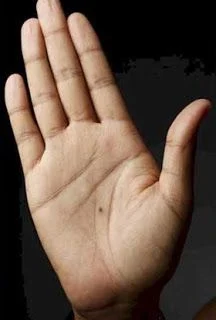In palmistry, the study of moles on the hand is known as moleosophy. According to some palmists, moles can have various meanings depending on their size, color, location, and shape.
Here are a few interpretations associated with moles on the hand in palmistry:
Position:
Moles on the palm's lines may suggest an influence on different aspects of life, such as career, relationships, and health.
Moles on the fingers can be associated with particular traits or characteristics related to that finger's symbolism.
Size:
Larger moles are believed to have a stronger influence than smaller ones.
A very large mole might indicate an intense impact on the person's life.
Color:
Different colors, such as red, black, or brown, are associated with specific interpretations, but these can vary between different sources.
Shape:
Round moles are generally considered positive and associated with good luck.
Irregularly shaped moles may be interpreted as negative or challenging influences.
Black Mole:
In palmistry, a black mole on the hand is sometimes associated with specific interpretations. However, it's important to reiterate that palmistry is not scientifically supported and should not be taken as definitive truth. These interpretations are based on traditional beliefs and superstitions. Here are a few possible interpretations:
Positive Interpretations:
Good fortune: A black mole on the hand is sometimes considered a sign of good luck or positive outcomes in various aspects of life.
Wealth and prosperity: It may be interpreted as a symbol of financial success or material abundance.
Negative Interpretations:
Health concerns: Some interpretations suggest that a black mole on the hand could indicate potential health issues or susceptibility to certain ailments. However, it is crucial to consult a medical professional for any health concerns.
Obstacles or challenges: It is believed that a black mole on the hand might symbolize obstacles or difficulties that a person may encounter in their life journey.
Meaning Of Moles On Mounts Of Hand Palmistry
In palmistry, the study of moles on the mounts of the hand is known as moleosophy. According to this practice, moles on different mounts of the hand are believed to have specific meanings and interpretations. Here are some common interpretations:
Mount of Jupiter (located below the index finger): A mole on this mount is said to indicate leadership qualities, ambition, and a strong desire for power and success.
Mount of Saturn (located below the middle finger): A mole on this mount is associated with a serious and disciplined nature. It may suggest a person who is practical, responsible, and inclined towards hard work.
Mount of Apollo (located below the ring finger): A mole on this mount is believed to indicate creativity, artistic talents, and a love for self-expression. It may suggest success in the fields of arts, entertainment, or public speaking.
Mount of Mercury (located below the pinky finger): A mole on this mount is associated with good communication skills, business acumen, and a talent for negotiation. It may suggest success in fields related to communication, commerce, or writing.
Mount of Venus (located at the base of the thumb): A mole on this mount is often considered auspicious. It may suggest a person with a strong romantic nature, attractiveness, and charisma. It is associated with success in love, relationships, and artistic endeavors.
The interpretations of moles on hand mounts vary across different cultures and palmistry traditions. Therefore, it's crucial not to take these interpretations too seriously or make life decisions solely based on them.
It's essential to remember that these interpretations are based on traditional beliefs and superstitions, rather than scientific evidence. Moles are usually harmless and benign skin growths, and any concerns about them should be addressed by a medical professional rather than relying on palmistry or moleosophy.
As you know interpretation of mole is different in Indian Palmistry than Western Palmistry.
Read Here - Mole Interpretation As Per Indian Palmistry



